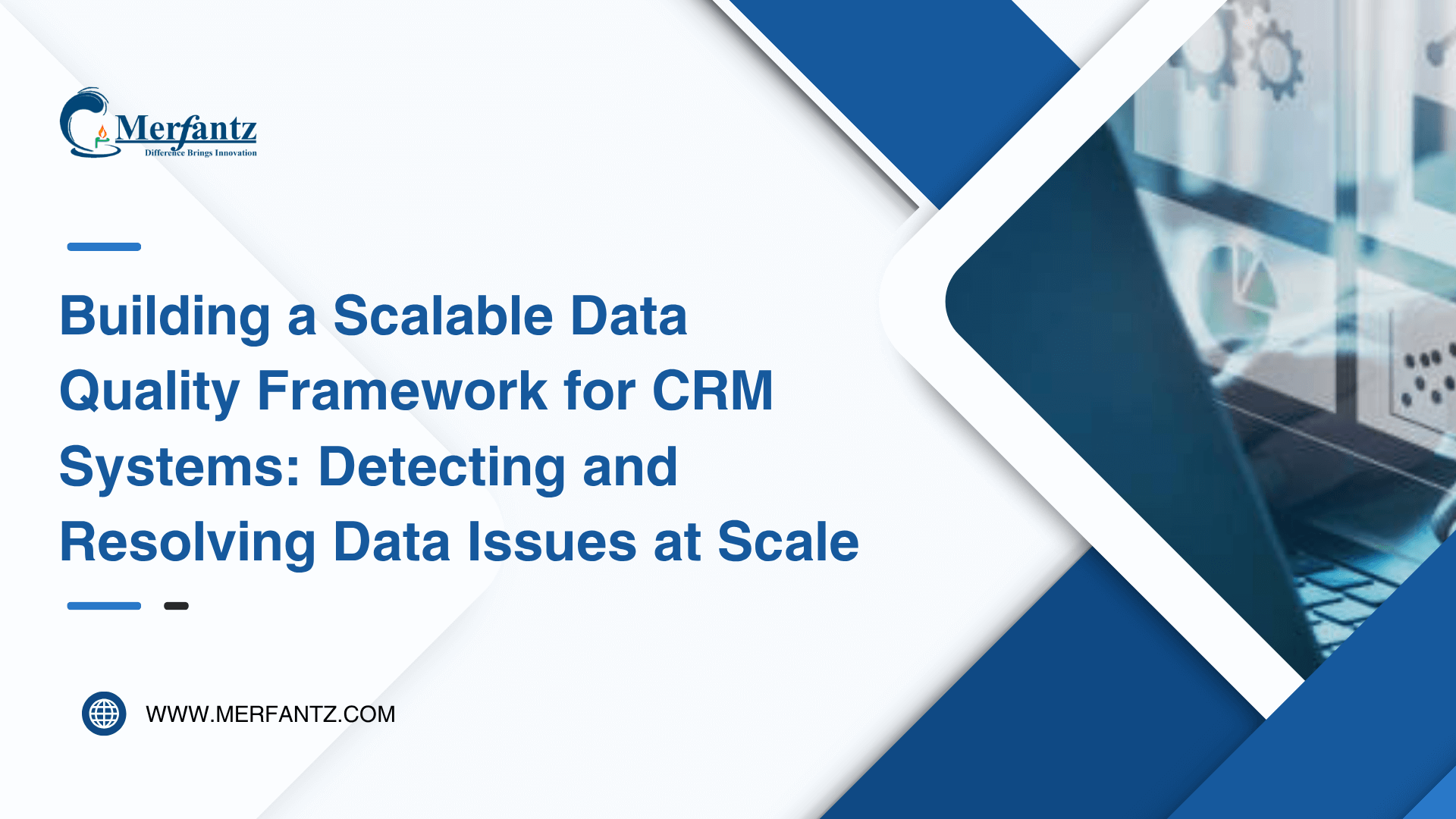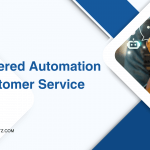
1. Introduction
Customer Relationship Management (CRM) systems hold massive amounts of business-critical data. However, poor data quality can degrade analytics, mislead decision-making, and erode customer trust. To combat this, businesses must adopt a structured data quality framework that detects and resolves data issues at scale. In this article, we detail our approach to building such a framework, powered by automated data validation, and the tangible improvements it delivered.
2. Business Challenge
Organizations today rely heavily on CRM data to drive marketing strategies, sales forecasting, and customer engagement. However, these systems often suffer from data integrity issues such as duplicate records, missing critical fields like email addresses or phone numbers, inconsistent formatting, and outdated information. These problems not only undermine the reliability of CRM systems but also complicate downstream processes.
Manual methods of identifying and correcting such issues are labor-intensive, prone to human error, and unsustainable at scale. According to Experian, up to 25% of CRM data becomes inaccurate every year. This degradation in data quality can lead to missed business opportunities, hinder regulatory compliance, and ultimately damage customer trust and retention. This is why a strong foundation in data governance is essential to ensure CRM systems maintain integrity over time.
3. Our Approach
To address the challenges in CRM data quality, we developed a robust data validation engine powered by Great Expectations combined with our own custom validation logic tailored for CRM-specific scenarios. This engine systematically scans datasets, applies rule-based checks, and flags anomalies such as missing values, duplicates, and format inconsistencies. We tested the framework on over 300,000 records, ensuring it could handle large-scale CRM databases. The output includes an interactive HTML report that visualizes key data quality metrics such as the Data Quality (DQ) Index, data loss percentage, missing data rate, and poor data percentage. These metrics are critical for monitoring ongoing data quality efforts.
The report also provides insights into column-wise data health, cardinality, and includes a navigation panel for quick access to specific field-level statistics. This approach enables both technical teams and business users to quickly understand the health of their data and take corrective actions accordingly. In parallel, our use of data profiling allowed us to identify trends and patterns in CRM data quality that had gone unnoticed before.
3a. What is Great Expectations?
Great Expectations is an open-source data validation framework that helps teams maintain high data quality by allowing you to define, test, and document expectations about your data. It integrates seamlessly with a wide range of data tools like Pandas, Spark, SQL databases, Airflow, and more. Our implementation also leveraged Great Expectations for data validation workflows and integrations with other tools.
It works by defining “Expectations” – which are assertions or rules about your data – and then validating datasets against those rules. The tool automatically generates rich HTML reports that are easy to share with data engineers, analysts, and stakeholders.
Key Features:
● Customizable, declarative expectations (e.g., expect column values to not be null)
● Automated data documentation with interactive HTML reports
● Integration with data pipelines (Airflow, Prefect, dbt, etc.)
● Support for Pandas, Spark, SQLAlchemy
● Profiling tools to generate initial expectations based on your data
Examples of Expectations Check for missing data:
expect_column_values_to_not_be_null(column=’email’)
Ensure data types are correct:
expect_column_values_to_be_of_type(column=’created_at’, type_=’datetime64[ns]’)
Official Source: https://greatexpectations.io/
3b. Input Sources
Our Data Quality Framework is designed to be highly flexible and supports multiple data input sources. Whether data resides in flat files or structured databases, the engine can ingest and validate them efficiently. It supports automated data validation regardless of the file type or source.
We primarily handle:
● Excel files (.xlsx) – Ideal for ad hoc uploads, analyst-prepared datasets, and manual data reviews.
● CSV files – Widely used for exports from CRM systems and other enterprise tools.
● SQL Database Connections – Directly connect to relational databases (like MySQL, PostgreSQL, MS SQL Server) to validate large, live datasets without exporting them.
Each input source is treated uniformly within the engine. Upon ingestion, the data is converted into a structured format (like Pandas DataFrames or Spark DataFrames) and then passed through the validation layer built on Great Expectations. This ensures consistency and reusability of rules across various data pipelines, regardless of the input format. This multi-source compatibility has been crucial in helping business teams plug data quality checks directly into their day-to-day data operations. Additionally, our framework emphasizes data cleansing techniques to resolve inconsistencies.
3c. Data Validation Engine
At the core of our framework lies the Data Validation Engine, purpose-built to enforce data quality standards across diverse CRM datasets. This engine orchestrates the validation workflow by combining Great Expectations with custom rule logic tailored for CRM-specific fields and formats. We also embedded data governance principles into the engine logic to align with compliance and policy requirements.
Once data is ingested, the engine performs a series of checks such as:
- Null Checks – Detecting missing values in key columns like email, phone, or industry.
- Uniqueness Checks – Identifying duplicate entries (e.g., repeated customer IDs).
- Format & Type Checks – Ensuring fields like dates and phone numbers match expected patterns.
- Range Checks – Validating numerical columns (e.g., revenue, age) fall within logical boundaries.
- Cardinality Checks – Analyzing the number of distinct values in each column to detect low-information or high-noise fields.
In addition to built-in expectations, we integrated custom logic to catch business-specific anomalies, such as mismatched lead statuses or inactive accounts with active transactions.
The engine supports both batch processing and real-time integration, making it suitable for large-scale CRM audits as well as continuous pipeline monitoring. It produces a complete validation report (in HTML or JSON), showing pass/fail metrics, summary statistics, and column-level insights for fast diagnostics. These insights are often derived from detailed data profiling across the CRM data.
This modular, reusable engine ensures consistent and scalable data validation while reducing manual intervention across teams. It also highlights how Great Expectations for data validation workflows can be extended with business-specific rules.
3d. Final Report
After the validation process, our engine generates a comprehensive Final Data Quality Report designed for both technical and business audiences. The report is output as a rich, interactive HTML file that visualizes key insights and allows users to quickly identify problem areas in their CRM datasets.
The report includes:
- Data Quality Index (DQI) – A composite score indicating overall data health.
- Missing Data Summary – Percentage of null values per column and overall.
- Poor Data Percentage – Fields with invalid, duplicated, or inconsistent entries.
- Data Loss Projection – Estimation of rows that would be discarded if hard validation rules were enforced.
- Cardinality Analysis – Shows uniqueness across categorical fields to identify noisy or low-variance columns.
Column-wise Insights – Every column is analyzed and visualized with:
- Pass/Fail count
- Value distributions
- Detailed exception logs
A navigation sidebar allows users to jump to any column report directly, making the review process intuitive and efficient. This report not only highlights existing issues but also helps data stewards and business analysts prioritize corrective actions. The format also supports documentation of data cleansing procedures for transparency and reproducibility.
With this structured reporting approach, our teams can track improvements over time, ensure compliance, and confidently trust CRM data in downstream analytics and decision-making.
4. Final Thoughts and Results
Implementing a scalable data quality framework transformed how we manage and trust our CRM data. By leveraging Great Expectations, combined with custom business rules and a streamlined validation engine, we were able to automate what was once a manual and error-prone process. These efforts significantly elevated our standards for data governance and data integrity.
Our solution processed over 300,000 CRM records, validating them across multiple dimensions—completeness, uniqueness, format correctness, business logic, and cardinality. The output: an interactive HTML report that offered full transparency into data health and helped both data engineers and business teams make informed decisions.
Key Results Achieved:
- 70% reduction in invalid CRM records
- Field completeness improved from 68% → 95%
- 30+ custom rules applied across 12 business-critical fields
- 60% drop in manual review efforts
- DQ Index improved to 92% overall health score
By automating validation and making data quality measurable and reportable, our teams can now detect issues proactively rather than reacting after problems affect operations. The approach is modular, repeatable, and easy to scale across new data sources and domains—making it a sustainable long-term solution for enterprise-grade CRM data governance.
This framework doesn’t just clean data it builds confidence in decision-making, improves operational efficiency, and ensures customer trust in every system powered by CRM data.


